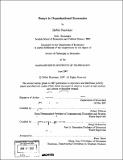Essays in organizational economics
Author(s)
Rantakari, Heikki
DownloadFull printable version (10.41Mb)
Other Contributors
Massachusetts Institute of Technology. Dept. of Economics.
Advisor
Robert Gibbons and Bengt Holström.
Terms of use
Metadata
Show full item recordAbstract
This thesis consists of three theoretical essays that examine the role of organizational architecture in facilitating organizational adaptation to a changing environment. Chapter 1 develops a model of coordinated adaptation where .an organization needs to respond to incoming information about its environment while at the same time retaining coordination between its activities. It analyzes how the allocation of decision rights inside the organization impacts the quality of decision-making and the accuracy of information transmission when information is both soft and distributed inside the organization. The results show that, contrary to the common intuition, the performance differential between centralized and decentralized decision-making is non-monotone in the importance of coordination. Further, both of these common structures are dominated by asymmetric structures in sufficiently asymmetric environments. Finally, if the incentive conflicts between the participants can be made sufficiently small, centralized decision-making is always dominated by decentralized decision-making. Chapter 2 extends the model developed in Chapter 1 to account for the endogeneity of incoming information and the use of monetary incentives to manage incentive conflicts inside the organization. (cont.) Focusing on the distinction between centralized and decentralized decision-making, the chapter examines how monetary incentives and the allocation of decision rights can be used to together to motivate information acquisition, support accurate communication and to guide decision-making. The results illustrate the robustness of the conclusions of Chapter 1 to the introduction of monetary incentives. In particular, centralization of decision-making authority is preferred only when coordination is sufficiently important and incentive alignment is too costly in terms of the compromised quality of incoming information. Chapter 3 analyzes a simplified two-party decision-making problem with a single decision and examines how environmental uncertainty, quality of available performance measures and interim access to information influence the joint determination of the allocation of authority, use of performance pay and direct controls. It uses the results from the model to cast light on (i) the conflicting empirical evidence on the risk-incentives trade-off found in work on executive compensation and franchising, (ii) complementarities in organizational design and (iii) the determinants of the choice to delegate.
Description
Thesis (Ph. D.)--Massachusetts Institute of Technology, Dept. of Economics, 2007. Includes bibliographical references (p. 137-143).
Date issued
2007Department
Massachusetts Institute of Technology. Department of EconomicsPublisher
Massachusetts Institute of Technology
Keywords
Economics.